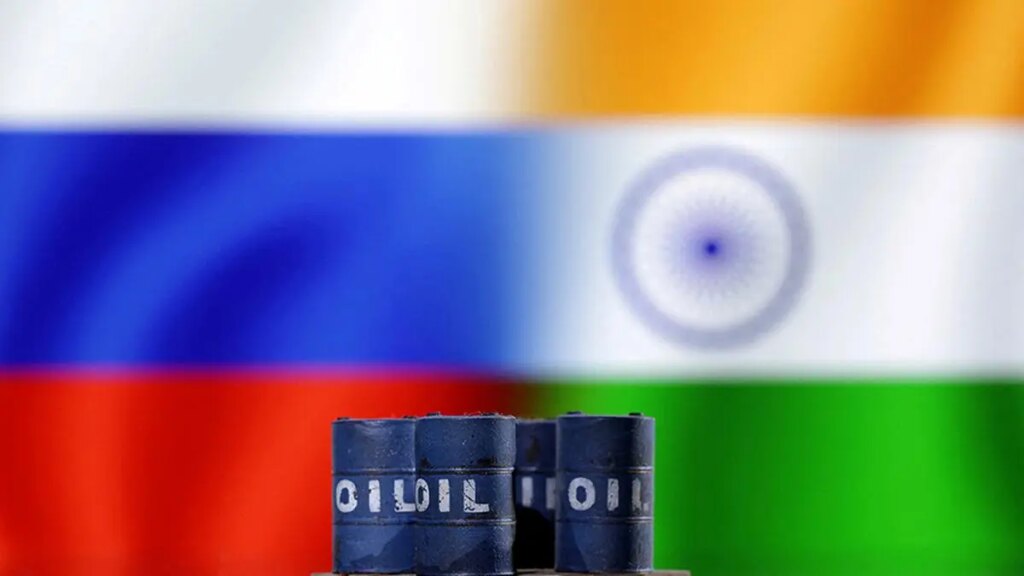
Key supplier: In FY25, Russia accounted for around 35 per cent of the total crude oil procured by India.
| Photo Credit:
Dado Ruvic
US President Donald Trump has endorsed a Bill that proposes a 500 per cent tariff on countries importing oil from Russia, a development that can destabilise India’s trade with its largest crude oil supplier.
The US Bill, if passed, would severely impact India’s crude oil trade with Russia. The crude oil trade between the two countries has risen for less than 2 per cent of India’s total imports in 2022 to as high as 40 per cent in a span of a couple of years. In FY25, Russia accounted for around 35 per cent of the total crude oil procured by India.
Responding to reports on further sanctions on Russian crude, Indian Oil Minister Hardeep Singh Puri explained that Russian oil was never under global sanctions. Sensible decision makers around the world were aware of the realities of global oil supply chains and how India was only helping the global markets by buying discounted oil under a price cap from wherever it could.
“Russia is one of the largest crude producers with over 9 million barrels/day. Imagine the chaos if this oil, amounting to about 10% of the global oil supply of around 97 million, vanished from the market. It would have forced the world to reduce its consumption, and since the consumers would be chasing the reduced supplies, the prices would’ve spiralled to over $120-130,” the Minister said on X.
Huge impact seen
An impact on the current oil trade between India and Russia would not only jeopardise the former’s energy security but also lead to higher import bill and possibly higher current account deficit (CAD).
“I’m looking at it. It’s an optional Bill. It’s totally at my option. They pass it totally at my option and terminate it totally at my option, and I’m looking at it very strongly,” Trump told reporters during a Cabinet briefing on Tuesday.
Trump’s comments came even as last week, External Affairs Minister S Jaishankar said shared India’s concerns with the US Senator Lindsey Graham over the Bill — Sanctioning Russia Act of 2025.
“I think our concerns and our interests in energy security have been made conversant to him,” the Minister said in Washington DC on July 2, 2025.
Russia has emerged as India’s largest crude oil supplier, accounting for more than one-third of its oil supplies. India procures crude oil from Russia on a spot basis. The energy trade relationship between the two countries has grown strong since 2022.
In the past also, there had been pressure on India to stop buying Russian crude. However, the government clarified on several instances that “the country’s energy security is important” and India will buy cheap oil wherever it gets it.
Sanctioning Russia Act
In April 2025, US Senators Lindsey Graham (Republican-South Carolina) and Richard Blumenthal (Democrat-Connecticut) led 50 US Senators – evenly divided by party affiliation – to introduce primary and secondary sanctions against Russia and actors supporting Russia’s aggression in Ukraine.
These sanctions would be imposed if Russia refuses to engage in good faith negotiations for a lasting peace with Ukraine or initiates another effort, including military invasion, that undermines the sovereignty of Ukraine after peace is negotiated. The legislation also imposes a 500 per cent tariff on imported goods from countries that buy Russian oil, gas, uranium and other products.
The Bill, Sanctioning Russia Act of 2025, states: “To impose sanctions and other measures with respect to the Russian Federation if the Government of the Russian Federation refuses to negotiate a peace agreement with Ukraine, violates any such agreement, or initiates another military invasion of Ukraine, and for other purposes.”
Government sources said that while nothing can be “conclusively” said about the progress in passing the said Bill, a disruption in Russian crude oil supplies to India would not only infuse more volatility in the crude oil market but also lead to higher prices, which in turn will stoke inflation, a scenario the US would want to avoid.
“Things are fluid at the moment. The government will be in a wait and watch over this. However, any disruption in the already stretched and bruised oil markets will have adverse consequences for prices (oil) and global demand. It will not benefit anyone,” said one of the sources.
Published on July 10, 2025

